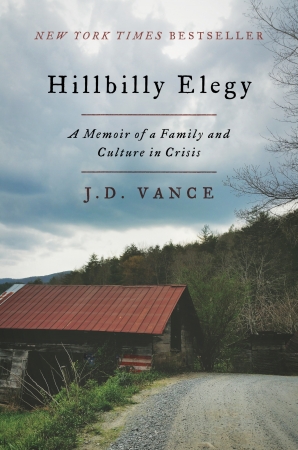by
I listened to Hillbilly Elegy on audio and it was especially enjoyable because it was narrated by it's author. It is the kind of story that makes one laugh at times and makes one heart sick at other times. And it brings up a lot of really good questions. I highly recommend the book. It is a memoir of the author's life who grew up in Middletown Ohio. His grandparents had migrated from South Eastern Kentucky after WWII. The book explains a great deal about some of the experiences that people from the culture the author grew up in experiences. Even though I recommend the book I do so with a caution. Do not read this book if you can't think critically about what you read. The author does a great job of pointing the problems and some of the origins of the problems. Then during the last 15 minutes of the book he offers what he considers the solutions. Which are typical white conservative christian male American opinions that do not address a lot of things. I do not disagree that a larger social structure will go a long way in helping kids and I do not disagree that the answers lie in empowering our children. But I think one has to be careful, especially when talking about empowering girls, if one says getting families to a church environment is going to do that. Some of the more liberal churches may be an excellent support system for families but they are not the only choice. For example, groups like scouts, participation in sports, and many other social structures can be the support system that families need. I do give the author credit that he cautions against the more conservative churches several times in the book, accusing them of shutting out the world instead of empowering the kids in their congregations to achieve their potential. I do agree that the right church can be a support system for families if that is the support system that they choose. My main objection to the books ending was not only the preachy ending but the over simplification of the solutions. I think if parents of working class poor families could just straighten up and be good parents they would in a heart beat. It is a lot more complicated than that. He did make many excellent points in the book. For example he explains how growing up in the culture he did "hardwired him for conflict". I think that is a very true conclusion. I don't want to spoil the book for others by sharing all the insight in this book. DO read the book. If nothing else it is a great spring board for discussion. Please click on the author's name and the title of the book above to follow links to more information. And enjoy the author's TED talk below.

No comments:
Post a Comment